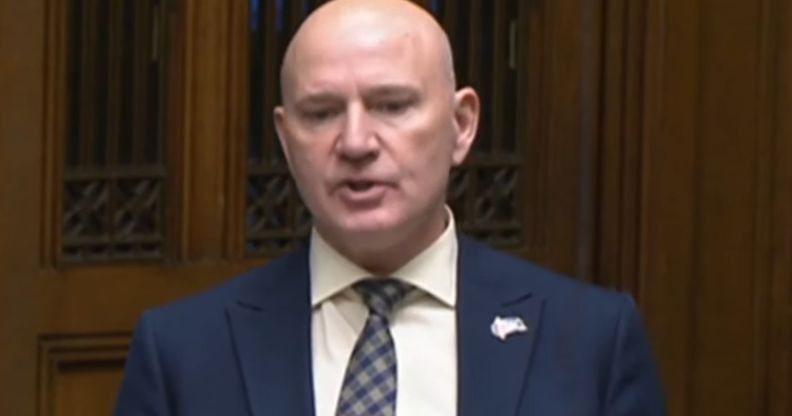Neale Hanvey criticised for comparing self-ID for trans people to Section 28

Neale Hanvey has been condemned for his column on trans equality in Scotland. (YouTube/Alba)
House of Commons Alba Party leader Neale Hanvey has been condemned for an opinion piece in which he compared self-ID for trans people to Section 28.
In a column published by The National on Tuesday (12 December), MP Hanvey claimed that a recently proposed conversion therapy ban was ignoring a “true scandal” of LGB people being forced to take hormones as a way to “trans away the gay.”
He also alleged that planned legislation promotes the idea that dysmorphic under-18s can “fix this with hormones and irreversible radical surgical intervention”.
This is not true. Not only does the conversion therapy bill proposed by Labour MP backbenchers on 4 December focus solely on banning abusive practices against LGBTQ+ people, but also under-18s are neither permitted to undergo gender-affirming surgery in the UK, nor are they permitted to start hormone-replacement therapy.
Instead, transgender people under the age of 18, most of whom are teenagers, are prescribed physically reversible puberty blockers – and only after a lengthy evaluation from medical professionals.
Despite this, Hanvey continued by saying that he believes the conversion therapy ban, and self-identification, are comparable to Section 28, referring to the “blacked-out windows of the gay bars of Edinburgh” and the “real risks” that LGBTQ+ people faced in the 1980s.
During the House of Commons debate on 6 December, Hanvey played a part in shifting the subject from conversion therapy to gender-affirming care.
Equality Network director calls Neale Hanvey’s column ‘disgraceful’
Responding to the column in an open letter, Tim Hopkins, the director of Equality Network, an LGBTQ+ rights group in Scotland, blasted Hanvey for his “disgraceful” opinion piece.
“In [1987/1988,] I was a member of the small group who organised the first campaign against Section 28,” Hopkins wrote. “I was one of a handful of gay men who set up Scotland’s ACT UP group to campaign against HIV discrimination.
“A couple of years after that, the late great campaigner [lawyer] Derek Ogg and I successfully lobbied for the first step, since Section 28, towards repeal of Scotland’s various anti-gay laws.”
Hopkins claimed Hanvey was not involved in any of these campaigns or those he referred to in his column, adding that his claims that those movements were “betrayed” by trans equality were false.
“The opposite is the case,” Hopkins said. “Those of us who organised the campaigns of the 80s and 90s can see clearly that the lies told then about lesbians and gay men are being repeated now about trans people.”
Hanvey’s claim that LGB people are being “pressured” into identifying as trans is “complete nonsense,” and were a repeat of a similar lie told about LGB people during the 1990s, Hopkins added.
“The clear understanding that most LGB people have of the true nature of the anti-trans culture war is one reason why, for example, a recent poll found that 97 per cent of lesbians under 25 support trans equality.
“As an openly gay MP in the 2020s, Mr Hanvey has benefited from a ladder to equality built over decades, rung by rung, by generations of activists. It is disgraceful that now he is reaching the top of that ladder, he is kicking down on the trans people who are still climbing it below him.”
Responding to the letter, Hanvey said Hopkins “thinks only his opinion matters.”
The MP for Kirkcaldy and Cowdenbeath went on to say: “While we may have not crossed paths before, he can’t dismiss or erase my activism.
“The unavoidable truth is that those who promote gender ideology are wilfully damaging the sex-based rights of women and LGB people. That is an easily demonstrable fact that sits at the heart of the Section 35 ruling [that blocked the Gender Recognition Reform (Scotland) Bill from being put forward for Royal Assent].”

